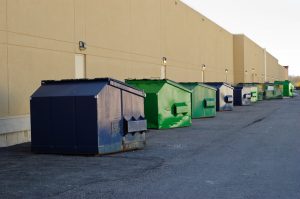Count the Ways You Can Save When you Rethink Trash Removal
 Trash removal doesn’t have to be the dreary topic it presumes to be, especially when you start to think outside the box and consider the bigger picture. So many good things can come from rethinking your trash removal and all the things associated with it. If you have yet to reassess your business or home waste management practices, then take some time to consider the amount of waste you’re producing and where it’s going. There are some very simple ways to get started in completely making over your waste removal standards, be it at work or home.
Trash removal doesn’t have to be the dreary topic it presumes to be, especially when you start to think outside the box and consider the bigger picture. So many good things can come from rethinking your trash removal and all the things associated with it. If you have yet to reassess your business or home waste management practices, then take some time to consider the amount of waste you’re producing and where it’s going. There are some very simple ways to get started in completely making over your waste removal standards, be it at work or home.
Find Your Waste Removal Devotees
Chances are there are people in your midst who are already secretly playing the goal of garbage police, taking it upon themselves to monitor the trash can even if it is unofficial. These are going to be your go-to people in beginning the transformation of waste removal in your business, and will keep the entire project from falling on the shoulders of ownership and management. Bring a team together around the common goals of reducing waste to both save the company money on hauling costs and by recycling, as well as giving something back to the community like less pressure on your local landfills.
Where is Your Waste Coming From?
The first place to start in remaking your waste removal strategy is to figure out what your waste consists of. The easiest way to do this, especially if you’re in a large facility, is to take on a weakly waste audit challenge. Checking your waste at the end of each day will give you a much better idea of where in your production the most waste is coming from. When you know where your garbage is being produced, you can then consider ways to reduce its creation and therefore waste removal as well.
Recycle Anything You Can
Many recyclables go completely overlooked, or are simply more convenient to throw in the trash for lack of a nearby recycling bin. A great place to start in reducing your waste is to vamp up your recycling program through first, education and second, logistics. Make sure you and your employees are aware of absolutely everything that can go in the recycling. Then make sure that there are always visible recycling bins around. Cardboard is a huge (quite literally the largest volume of waste created) culprit of recyclable goods ending up in landfills, and is usually easily avoided with the right measures in place.
Reuse or Regift
A lot of your waste, you will find, may not be recyclable but might still have some purpose or use for another business in your area or perhaps a local junk collecting store for all those DIYers out there. It could surely take some extra time to get this project going in full force, but it will also help your business build ties with the community around it, and potentially give an employee an exciting new job to take hold of.
Don’t underestimate the power of reducing your waste removal costs by taking these few steps seriously. If you want to do even more you can call KenBay to learn about our state of the art trash compactors and how we can help you improve your waste management practices.


 When you begin to assess your waste management processes, the ideal scenario is always based on a zero waste goal. For most industrial and manufacturing companies that isn’t realistic. One of the first things you want to consider when analyzing your waste systems is that pesky
When you begin to assess your waste management processes, the ideal scenario is always based on a zero waste goal. For most industrial and manufacturing companies that isn’t realistic. One of the first things you want to consider when analyzing your waste systems is that pesky 